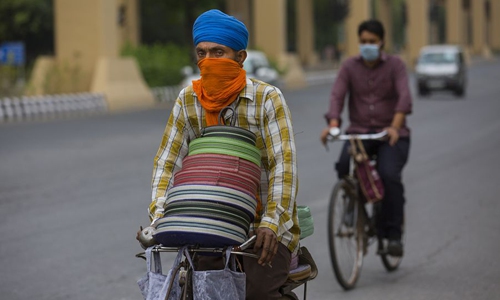Chinese in India say they are being harassed amid rising anti-China sentiment following border clash
By GT staff reporters Source:Globaltimes.cn Published: 2020/6/24 0:21:15

A man covers his face with a piece of cloth as he cycles to transport goods during the lockdown in New Delhi, India, May 13, 2020. Photo: Xinhua
Some Chinese living in India say its unsafe for them to go out in public and have closed their shops amid a boycott that has included anti-China graffiti and the burning of Chinese flags. Some of the right-wing Indian nationalists have been detained for their actions, said media reports.
The wave of anti-China sentiment in India erupted after a border clash in Galwan Valley between China and India.
Since then some Indians have launched campaigns calling for a boycott of Chinese products and businesses. Anti-China protests are being held in many cities.
Chinese living in India reached by the Global Times said anti-China sentiment has impacted their daily lives, and some have had to close their stores and restaurants because of boycotts. They said they're concerned strong Indian nationalism and anti-Chinese sentiment in the wake of the border clash could erupt at any time. They frequently see news reports of protests at local Chinese-owned factories and the destruction of Chinese products.
They say they're frightened by radical and illegal anti-China demonstrations and hope the border clash doesn't destroy the friendship between Chinese and Indian people. Chinese expatriates in India have called for the two countries to rebuild mutual trust.
China and India have agreed to take necessary measures to de-escalate the situation. The two sides also agreed to maintain dialogue and work together to promote peace and tranquility in the border areas, Zhao Lijian, a spokesperson of Chinese Foreign Ministry, announced on Tuesday.
Suffering from Sinophobia
Cheng Feng (pseudonym) a Chinese expert studying China-India relations has seen "Boycott China" graffiti written in Hindi and English in popular New Delhi markets.
Cheng, who has been living in India for two and a half years, said some Chinese are protecting themselves by carrying a stick when they have to venture outside.
The right-wing student group Akhil Bhartiya Vidhyarthi Parishad (ABVP) staged a sit-in and chanted anti-China slogans outside the Chinese Consulate General in Kolkata. In New Delhi, members of the Swadeshi Jagran Manch, an affiliate of the right-wing Rashtriya Swayamsevak Sangh (RSS), were detained by police during an anti-China demonstration, according to media reports.
Members of another right-wing group, Hindu Sena, defaced the sign outside the Chinese embassy in New Delhi on Tuesday, Indian media PTI reported.
A Chinese employee living in Mumbai, told the Global Times on condition of anonymity that police, carrying a stack of documents about Chinese living in his community, came to his home on June 18 to check his ID and asked personal questions about his stay in India.
Another Chinese living in Gurgaon, 30 kilometers from New Dehli, said on social media that police had visited local Chinese and advised them to avoid going out in public and to protect themselves from violent anti-Chinese street protests.
Indians of Chinese descent have been attacked simply because of their Chinese facial features, according to media reports.
An Indian of Chinese descent, surnamed Wu, told the Global Times on Monday that his beauty salon and Chinese restaurant in Bangalore have been forced to close because of the boycott, and that even a sign in Chinese characters can incite anti-Chinese sentiment among locals.
"People will even burn Chinese flags in front of our stores," he said. "But this kind of behavior mainly comes from the lower and middle classes in Indians who are more easily incited. Many lost their jobs during the epidemic and are venting their discontent through anti-Chinese protests."
Some Indians of Chinese decent have even posted signs on their doorstep to emphasize they are Indian, said Wu. "But not all Indians are anti-Chinese. The majority of Indians, especially those who are educated or in the upper-class, have remained rational and friendly to Chinese," he said.
Eager for trust
Cheng Feng told the Global Times that "Boycott China" protests are more often held in remote areas and in Hindi-speaking regions. Anti-Chinese sentiment was further inflamed by the Indian government's high-profile funerals of the Indian soldiers who died in the border clash, he said.
After the clash, Cheng received a phone call from an Indian expert who also studies international relations, asking him if China was going to "invade India." All of the incidents shows the latent hostility some Indian people have toward China, Cheng said.
"'Boycott China' reflects a serious lack of mutual trust between the two countries," he said, adding that "this is the result of the Sino-India border conflict in 1962, the Dong Lang (Doklam) standoff in 2017, and the longstanding unresolved issues of border water resources, a trade imbalance and terrorism."
To rebuild long-lasting and stable mutual trust between the two countries, it is important to end anti-China sentiment by better informing Indians about China, Cheng noted.
Posted in: DIPLOMACY,CENTRAL & SOUTH ASIA